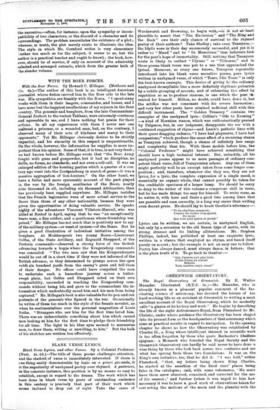BLANK VERSE LYRICS.
Blank Verse Lyrics, and other Poems. By a Colonial Professor. (Nutt. 25. 6d.)—The title of these poems challenges attention, and the student of verse is immediately interested. If there is cue thing easily demonstrable by logic on a priori gro unds, it is the superiority of unrhymed poetry over rhymed. A posteriori, in the concrete instance, this position is by no means so easy to establish, except in regard to the drama. The work which has been done in blank verse by poets of outstanding eminence in this century is precisely that part of their work which seems inclined to drop out of sight. Take the cases of Wordsworth and Browning. to begin with,—is it not at least plausible to assert that "The Excursion" and "The Ring and the Book" owe their only chance of survival to the rhymed poetry of their authors ? Take Shelley ; take even Tennyson,— the Idylls were in their day enormously successful, and yet it is rather to " Maud " and to "In Memoriam" that believers look for the poet's hope of immortality. Still, nothing that Tennyson wrote is likely to outlast " Ulysses " or " Tithonus," and in these poems blank verse was put to a use that approached the lyrical. Moreover, as every one knows, Tennyson repeatedly introduced into his blank verse narrative poems, pure lyrics written in unrhymed verse, of which "Tears, Idle Tears" is only the best-known example. This device of giving to the ordinary unrhymed decasyllabic line a more definitely rhythmic pulsation by a subtle grouping of accents, and of enhancing the effect by repetition so as to produce stanzas, is one which the poet in- vented for himself. Milton, no doubt, could have don e it, but the artifice was not consonant with his severe harmonies ; and very few other poets have attained sufficient skill with this difficult instrument. The "Golden Treasury" contains two examples of the unrhymed lyric : Collins's "Ode to Evening" —a kind of Horatian stanza, which was enthusiastically praised by Palgrave, but, in our judgment, disappoints the ear with a continued suggestion of rhyme—and Lamb's pathetic lines with their queer dragging cadence, "I have had playmates, I have had companions," which produce the same effect of a recurring stanza as Tennyson achieved, though a stanza of infinitely less range and complexity than his. With these models before him, the "Colonial Professor" might have achieved something that should have a high technical interest. But, unluckily, all his unrhymed poems appear to us mere passages of ordinary com- petent blank verse, full of Tennysonian echoes. Any one of them might perfectly well be an excerpt taken from some longer com- position; and, therefore, whatever else they are, they are not lyrics, for a lyric, the complete expression of a single mood, is essentially an organic whole, that cannot possibly be taken for the creditable specimen of a larger lump. We should be sorry to deny to the writer of this volume a competent skill in verse, but he has made things too easy for himself. To write verse, as he writes it, with here and there a good line among lines that are passable and scan correctly, is a long way easier than writing even decent prose. He should lay to heart Gautier's utterance :— " Fi du rhythme commode.
Comme un Fruitier trop grand, Du mode Que tout pled quitte et prend."
Lyrics can be written, we are certain, in unrhymed English, but only by a reversion to the old Saxon type of metre, with its strong stresses and its linking alliterations. Mr. Stephen Phillips, indeed, has published at least one exquisite lyric, written in a stanza that employed no rhyme, and based itself purely on accent ; but the example is not an easy one to follow. Poetry has always danced, must always dance, in fetters; that is the plain truth of it. To go back to Gautier :—
"On!, l'ceuvre sort plus belle D'une forme au travail Rebelle, Vera, ruarbre, onyx, divan."






















































 Previous page
Previous page